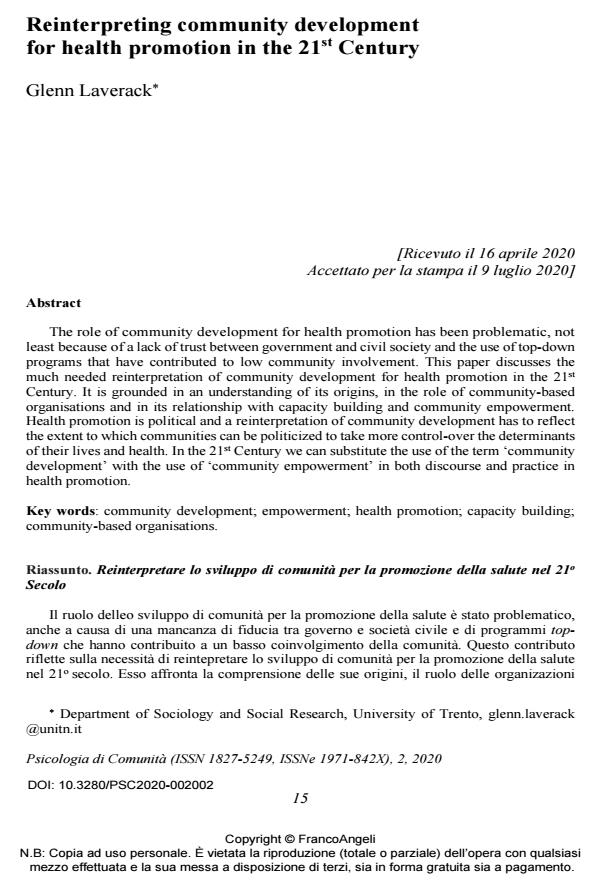Reinterpreting community development for health promotion in the 21st Century
Journal title PSICOLOGIA DI COMUNITA’
Author/s Glenn Laverack
Publishing Year 2020 Issue 2020/2
Language English Pages 8 P. 15-22 File size 206 KB
DOI 10.3280/PSC2020-002002
DOI is like a bar code for intellectual property: to have more infomation
click here
Below, you can see the article first page
If you want to buy this article in PDF format, you can do it, following the instructions to buy download credits

FrancoAngeli is member of Publishers International Linking Association, Inc (PILA), a not-for-profit association which run the CrossRef service enabling links to and from online scholarly content.
The role of community development for health promotion has been problematic, not least because of a lack of trust between government and civil society and the use of top-down pro-grams that have contributed to low community involvement. This paper discusses the much needed reinterpretation of community development for health promotion in the 21st Century. It is grounded in an understanding of its origins, in the role of community-based organisations and in its relationship with capacity building and community empowerment. Health promotion is political and a reinterpretation of community development has to reflect the extent to which communities can be politicized to take more control-over the determinants of their lives and health. In the 21st Century we can substitute the use of the term ‘community development’ with the use of ‘community empowerment’ in both discourse and practice in health promotion.
Keywords: Community development; empowerment; health promotion; capacity building; community-based organisations.
- Bianchi, M. (2017). The Italian Community Cooperative. Analysis of impact on local territories through the Social Capital. Research proposal. -- Retrieved from https://www.researchgate.net/publication/322940481 (Accessed 15/3/2020).
- Brown, P., & Zavestoski, S. (2004). Social movements in health: an introduction. Sociology of Health & Illness, 26(6): 679-694.
- Freire, P. (2005). Education for Critical Consciousness. New York: Continuum Press.
- ILO, UNESCO, & WHO (2004). CBR: A strategy from rehabilitation, equalization of opportunities, poverty reduction, and social inclusion of people with disabilities (joint position paper). Geneva: World Health Organisation.
- Labonte, R. (1998). A Community Development Approach to Health Promotion: A Background Paper on Practice Tensions, Strategic Models and Accountability Requirements for Health Authority Work on the Broad Determinants of Health. Edinburgh: Health Education Board for Scotland.
- Labonte, R., & Laverack, G. (2001). Capacity Building in Health Promotion, Part 1: For Whom? And For What Purpose? Critical Public Health, 11(2): 111-128. DOI: 10.1080/0958159011003983
- Laverack, G. (2014). The Pocket Guide to Health Promotion. London: McGraw-Hill.
- Mazzoni, D., van Zomeren, M., & Cicognani, E. (2015). The Motivating Role of Perceived Right Violation and Efficacy Beliefs in Identification with the Italian Water Movement. Political Psychology, 36(3): 315-330.
- Public Health England (2015). A Guide to Community-Centred Approaches for Health and Well-Being; Report Number: 2014711. London: Public Health England.
- South, J., White, J., & Gamsu, M. (2013). People-centred public health. Policy Press. Bristol: University of Bristol.
- Wagemakers, A., van Husen, G., Barrett, J., & Koelena, M. (2015). Amsterdam’s STI/HIV programme: An innovative strategy to achieve and enhance the participation of migrant community-based Organizations. Health Education Journal, 74, 411-423. DOI: 10.1177/001789691454266
- World Health Organisation (1986). Ottawa Charter for Health Promotion. Geneva: World Health Organisation.
- World Health Organisation (2005). The Bangkok Charter for Health Promotion in a Globalized World. Geneva: World Health Organisation.
- World Health Organisation (2008). Closing the gap in a generation. Commission on Social determinants of Health. Final Report. Geneva: World Health Organisation. Retrieved from www.who.int/social_determinants (Accessed 6/3/2020).
- World Health Organisation (2016). The Shanghai Charter for Promoting health in the Sustainable Development Goals: Health for all and all for health. Geneva: World Health Organisation.
Glenn Laverack, Reinterpreting community development for health promotion in the 21st Century in "PSICOLOGIA DI COMUNITA’" 2/2020, pp 15-22, DOI: 10.3280/PSC2020-002002